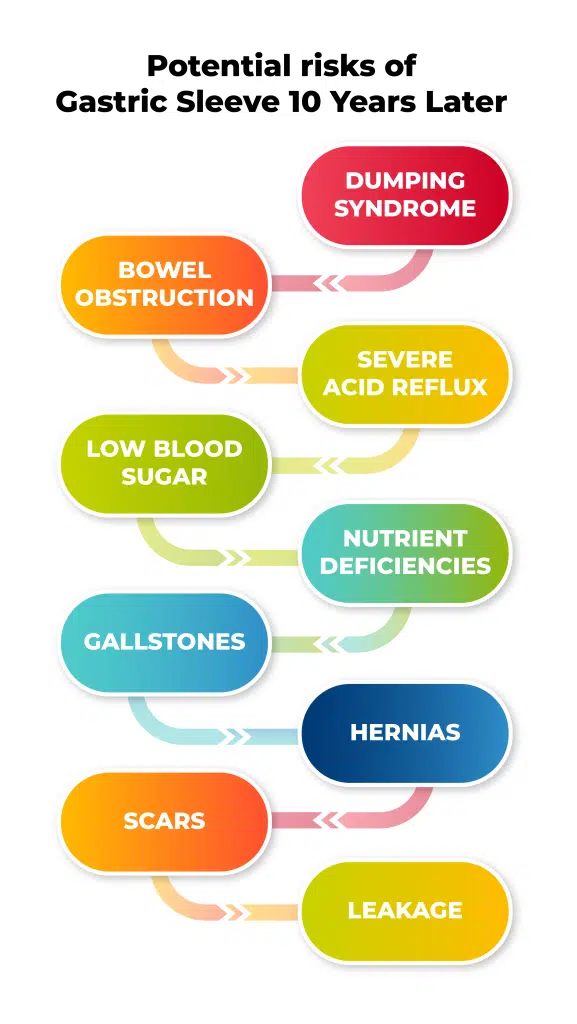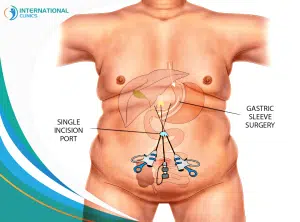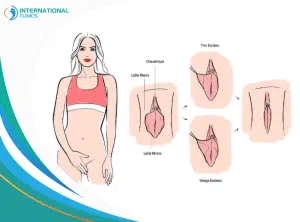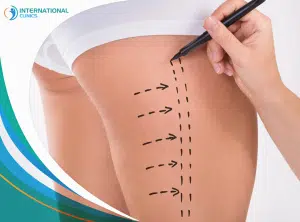Gastric sleeve is a type of weight loss surgery that entails extracting roughly 75-80% of your stomach. Although the surgery is known for being highly effective and safe in the short and long term, many people speculate about the results of gastric sleeve 10 years later.
The surgery leaves you with a stomach that takes the appearance of a banana, akin to a “sleeve”. Your new stomach only can hold around 5-6 ounces of food and liquids. Gastric sleeve in Turkey, in particular, can largely contribute to the reduction in overall caloric intake and facilitates weight loss.
Nonetheless, what could happen after 10 years following the surgery is something interesting and worth investigating because a gastric sleeve is a “permanent” solution that must remain active for years to come.
Gastric Sleeve 10 Years Later: Results & Improvements

According to recent studies, patients who have undergone gastric sleeve surgery have shown significant improvement in their quality of life even after a decade following the procedure. The improvements manifest in the following aspects:
Noticeable Weight Loss
As you may expect, 10 years are enough to show up the full results of gastric sleeve. On average, people lose around 55% of their original excess body weight after 10 years. Some may lose more than this percentage, depending on their commitment to a healthy lifestyle.
One crucial factor that determines the long-term success of the surgery is the percentage of excess weight loss, which refers to the amount of weight you lose above your ideal body weight.
Research examining long-term weight loss after the gastric sleeve indicates that the average excess weight loss changes over time. After 5 years, the average was 62.3%, then it decreased to 53.8% after 6 years, 43% after 7 years, and rose again to 54.8% after 8 or more years following the gastric sleeve procedure.
However, the 10-year success rate after undergoing gastric sleeve is observed to be only 41% according to a study. Hence, the surgery should only be recommended to selected patients, including people with low BMI (Body Mass Index) and without preoperative symptoms of acid reflux GERD.
Normal Food Tolerance
Gastric sleeve surgery in Turkey may cause a certain level of food intolerance. Thankfully, most people return to the normal level of food tolerance as the years go by after gastric sleeve. Indeed, 95.2% of people report acceptable to excellent food tolerance, which is a significant aspect of a better quality of life.
Disease Prevention
Obesity-related illnesses, such as type 2 diabetes and high blood pressure, can be put into remission following the surgery. As a result, people may experience an increase in overall welfare, self-confidence, mobility, and social life.
Interestingly, the incidence of depression can decrease significantly after the procedure. However, it is important to note that each patient’s experience may differ, and the level of benefits will depend on several factors.
Gastric Sleeve 10 Years Later: Possible Weight Gain
Unfortunately, the reality after gastric sleeve surgery isn’t always straightforward. While the majority of people happily lose weight over the years and escape the dangers of obesity, some people may gain weight, especially those who ignore the instructions of the surgeons or cheat on their post-op diet.
Indeed, approximately 13-30% of gastric sleeve patients are estimated to experience long-term weight regain. In fact, some patients may gain up to 2% of their starting weight back or even more.
That isn’t something common, but it happens in some cases. Weight gain following the gastric sleeve procedure is often related to patient diet cheating and lifestyle factors.
Early weight loss progress during the first 1-3 months after surgery can potentially predict your long-term weight loss results.
Therefore, it’s highly recommended that high-risk individuals start implementing dietary and lifestyle modifications as soon as possible after the surgery.
Uncover: Gastric sleeve cost in Turkey
Gastric Sleeve 10 Years Later: Potential risks

In the long term, gastric sleeve has been shown to produce fewer side effects and complications when compared to other types of obesity surgery in Turkey. In fact, the adverse health effects are dramatically less than those who ignore all bariatric procedures altogether.
However, there is a somewhat higher incidence of gastroesophageal reflux. A small number of people require revision surgery to a gastric bypass 10 years after the procedure because of severe reflux. the surgery can be revised or upgraded with revision surgery to achieve successful results and resolve regrets.
On the positive side, severe vitamin or micronutrient deficiencies are minimal. Low levels of vitamin D, iron, and B12 can be solved easily using oral supplementation. Hence, gastric sleeve surgery is generally safe. Nonetheless, like any other surgery, it can have some potential complications in the long run. These complications may include:
- Dumping syndrome
- Bowel obstruction
- Severe acid reflux
- Low blood sugar
- Nutrient deficiencies
- Gallstones
- Hernias
- Scars
- Leakage
Gastric Sleeve 10 Years Later: How to Keep the Results?
Although some weight gain after gastric sleeve surgery is inevitable in many cases, there are certain measures you can take to improve the long-term outcomes and keep the good results. Prior to and after the procedure, the surgeon will guide the patient through the lifestyle modifications and tips that may be required to fulfill this purpose. Below are some of these tips:
Follow the Right Lifestyle Changes
To sustain weight loss, you must make ongoing changes to your lifestyle. Complying with these changes is crucial to achieving overall success. This could entail embracing a healthier diet and engaging in more physical activity. After all, committing to healthier habits and attitudes that facilitate weight loss will have the most direct effect on sustaining weight reduction over the long term.
When it comes to diet, this may involve the consumption of certain foods in a particular order and in specific portion sizes to ensure that the patient obtains the nutrients they require without promoting weight gain.
Get the Necessary Support
Building a support network with individuals around you can help maintain your motivation, facilitate success, and remain on track with your weight loss goals. Most gastric sleeve patients prefer to keep in touch with other patients who underwent the surgery. This helps them share their experiences and get more advice on many things.
Keep the Contact Channels Open with Your Surgeon
Maintaining open lines of communication with your bariatric surgeon and their team is critical. If you observe any weight regain, make an appointment to speak with them so they can identify the root cause and work with you to find the most effective solution. They are here to aid you in your weight loss journey and are committed to assisting you.
The Bottom Line
The results and changes of gastric sleeve 10 years later are commonly positive and worth speculating. Patients enjoy better life quality and easily can reach their weight loss goals. Besides, the surgery prevents various obesity-related problems, including diabetes.
However, some patients may gain weight in the years that follow the surgery. It’s also possible for some complications and side effects to develop, which may require revision surgery in some cases. Thus, it’s extremely important to stick to diet instructions given by the surgeon.
International Clinics in Turkey provides special packages for those who seek gastric sleeve abroad. The packages include follow-up consultations in the years the following the procedure. You can contact us immediately using the Contact Us button below.
Frequently Asked Questions (FAQ)
How Many Years Does Gastric Sleeve Last?
Gastric sleeve lasts for years to come. In other words, the surgery is supposed to be a permanent solution to obesity. However, many patients might exhibit a tendency to regain weight after approximately 2 years from the primary surgery. To avoid this problem, you need to adhere to the diet recommendations of your surgeon.
What Problems Can Gastric Sleeve Cause Years Later?
Problems that gastric sleeve can cause years later include persistent gastroesophageal reflux, nausea and vomiting, gastrointestinal obstruction, hypoglycemia, malnutrition, and hernias.
Is Gastric Sleeve Better Than Bypass 10 Years Later?
According to a study, the mean total score for quality of life was 0.64 for gastric sleeve and 0.41 for gastric bypass after 10 years following the procedures. Hence, a gastric sleeve seems better than a gastric bypass in the long run.
Can You Get a Second Gastric Sleeve?
You can get a second gastric sleeve or “re-sleeve” surgery only if necessary. However, the former procedure usually carries out an elevated risk of complications, including gastric fistula.
What Are The 10 Year Results of Sleeve Gastrectomy?
The 10 year results of sleeve gastrectomy include better quality of life, sustained weight loss, decreased likelihood of obesity-related diseases, and better tolerance to food.
Can a Gastric Sleeve Reverse Itself?
Gastric sleeve can’t reverse itself, unlike other procedures such as an adjustable gastric band and gastric bypass. In other words, the surgery can’t be undone, but you can get a revision or re-sleeve surgery if your case requires that.
Read more:
Gastric Sleeve Surgery Abroad: Best Destinations & Packages
Obesity Surgery Cost in Turkey







